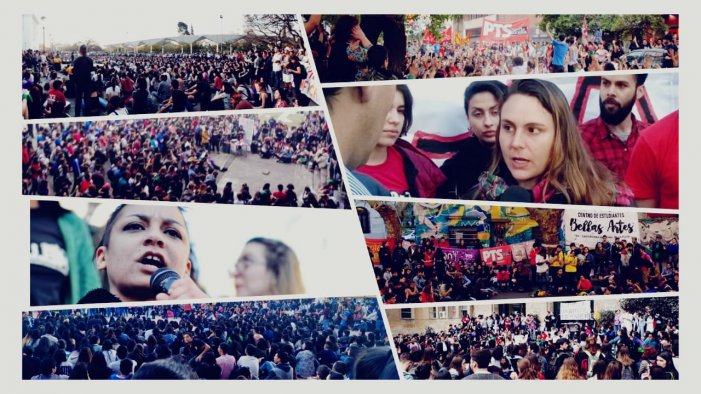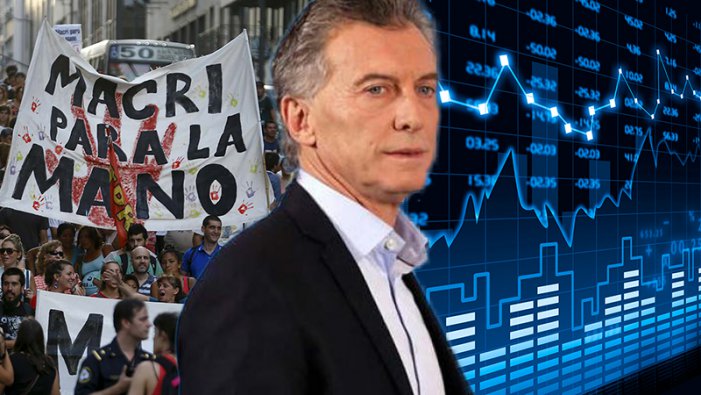Massive anti-austerity mobilization in Cordoba, Argentina on August 22.
Early in the morning on Wednesday, August 29th, President Macri gave a one-minute speech to the world markets, announcing a new “deal” with the IMF that would “ensure” Argentina’s financing for 2019. Immediately following this speech, the peso lost 8% of its value in a single day – the biggest drop in recent history. The drop came after the IMF announced that there was no such deal at present and that any agreement, if it could be reached at all, was still in negotiation. Macri’s strategy of telling the markets what he thinks they want to hear, regardless of factual evidence, created a sense of utter distrust in the Argentine government.
With the peso in a free fall, the main labor unions, CGT and CTA, both called for general strikes, but not until the end of September, which seems like years from now, amidst a crisis that is turning every minute turn into hours, hours turn into days, and days into weeks.
The latest economic crisis quickly developed into a political crisis. It is creating what some analysts are calling a “vicious cycle” wherein the political instability and uncertainty feed the economic crisis, which in turn feeds the political crisis with no end in sight.
This is at a time when the judicial system is leading a political prosecution campaign against the former Pink Tide government led by Cristina Kirchner on grounds of its many corruption scandals. Similar to the Italian Mani pulite or the more recent Brazilian Lava Jato, a wave of politicians and business people have declared themselves guilty of giving or receiving bribes in exchange for political favors or government contracts. One scandal is known as the #CuadernoGate or #NotebookGate because the case began with the discovery of a set of notebooks. These notebooks, or rather photocopies of the notebooks (the originals were never found), included information about the amounts of the bribes that were handed out, as well that the specific times when and places where this took place.
The effect that the scandal had on the economy was similar to what happened in Brazil. The businesses involved in corruption scandals are losing contracts, their stocks are falling, and a new wave of layoffs has begun. The latest government statistics show that the Argentine economy is now in a recession. The previous measures of Macri’s government to dollarize key sectors of the economy, such as the utility bills and fuel prices, make every dollar increase add to the inflation rate, which is now the second highest in the world, after Venezuela. The government’s plan to overcome the crisis is to impose even more austerity measures. In return for these austerity measures, the IMF will provide a “rescue package” that would allow the Argentine government to repay its debt to the same IMF and avoid going into default.
Education and health are the primary targets of the austerity measures. Argentina has not only a free and public national healthcare system but also a free and public education system. The IMF is eager to liquidate both.
However, students, teachers, and the population are not ready to give away their historic achievements. The current protests are coming on the heels of the historic abortion rights mobilizations recently, when hundreds of thousands of people took to the streets for the right to an abortion, only to be thwarted by a few dozen members of the Senate. The momentum from these mobilizations has fed directly into the student movement for public education.
💪 Más de mil personas en la asamblea interfacultades de esta tarde en #Jujuy. La #MarchaNacionalUniversitaria de este jueves se organiza desde abajo. #ParoUniversitario https://t.co/teDmUe8Fq7 pic.twitter.com/NKFFoIIN8o
— La Izquierda Diario (@izquierdadiario) August 28, 2018
Over 1,000 students in an assembly in Jujuy, Argentina.
There have been student assemblies around the country with over a thousand students discussing the economic crisis, the crisis of the universities, as well as the demand for the separation of church and state, a demand made by the abortion rights movement. Universities around the country have been occupied by students and teachers, who are protesting against the lack of government funding. Across the nation, university professors and staff have been on strike for over 50 days. Education workers are still fighting for salary increases that should have been resolved at the beginning of the year. The government continues to insist on a 15% salary increase when the inflation rate tops 20% and is expected to be no less than 35% by the end of the year.
Later today, there is a march in defense of public education that will include bring out students and teachers to protest Macri’s government and the IMF. Workers in the shipyards, hospitals, and other affected sectors are also fighting for their jobs with the support of their communities. The connections between these struggles creates a politicized and volatile atmosphere. The struggles are widespread and likely to intensify.

At the time of publication, the markets in Argentina have reopened. The moment the markets opened, the dollar jumped 50 cents to 35 pesos. An hour later, the peso was at 40 pesos. The crisis is unfolding at a speed that no one, not even the worst critics, could have imagined.
The similarities with the 2001 crisis that resulted in President De la Rua escaping from the government palace in a helicopter is haunts President Macri. The similarities do not escape the millions of people who know the IMF’s plan is to make workers, students, and the poorest sectors of society pay the cost of the crisis. The outcome is still unclear. The government is in shock, and the crisis is escalating. Only the massive mobilization of the women that took the streets for abortion rights, of the students that are occupying universities and of the thousands of workers fighting against layoffs and austerity measures can put a stop to the government and the IMF.











